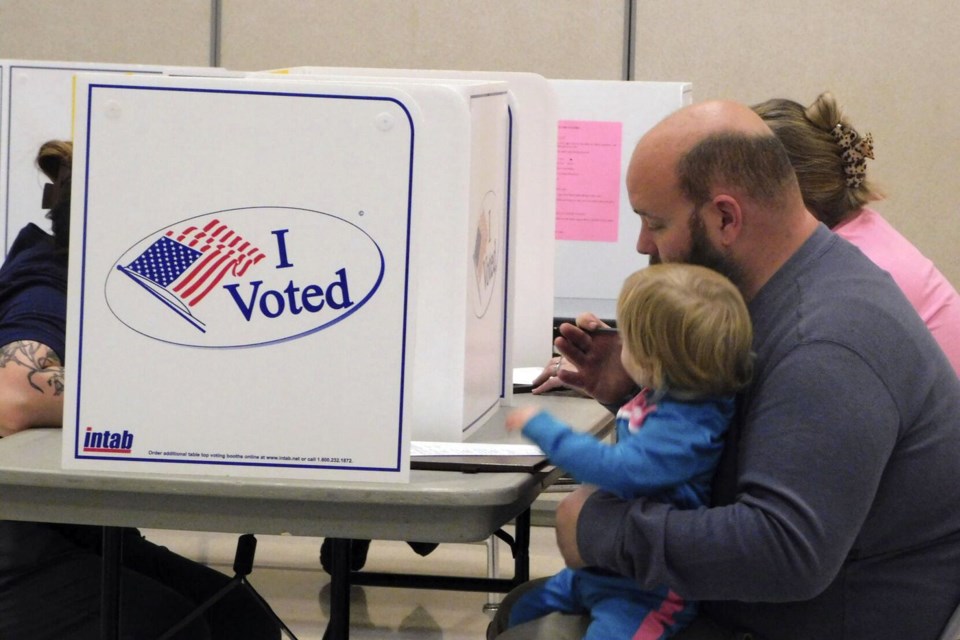Voters in South Dakota have rejected a proposal to add protections for abortion rights to the state constitution, preserving a near-total ban there.
The abortion measure was in a crowded field of ballot initiatives for Tuesday's general election that also included a proposal to legalize marijuana for recreational use. After most votes were counted Wednesday, the marijuana measure was defeated. Voters also rejected a measure to remove the state sales tax from food and a plan for a single, all-candidate primary election with the top two finishers for each office advancing.
Here is a look at the biggest ballot initiatives.
Voters stay the course on abortion
The abortion vote in South Dakota followed the of a proposed change in its state constitution to protect abortion rights — the first time abortion opponents have won a statewide vote since the U.S. Supreme Court's Dobbs decision overturning Roe vs. Wade in June 2022.
The South Dakota measure would have barred restrictions on terminating a pregnancy during its first 12 weeks.
From the 13th through the 26th week of pregnancy, state regulations would have had to be “reasonably related" to the patient's physical health. Even after the 26th week, the state would have had to permit abortions to preserve a patient's life or health.
The ban in place since the Dobbs decision makes it a felony to perform an abortion except to save the life of the patient.
Supporters of recreational marijuana try again
South Dakota voters rejected a measure that would have legalized the use of recreational marijuana, continuing a back-and-forth fight over efforts to allow the use of the drug.
Voters turned down the measure that would have legalized recreational marijuana for people 21 and older and set limits on how much they could possess. The proposal also would have allowed the cultivation of marijuana.
Voters have weighed in repeatedly on marijuana in the past eight years. They ultimately allowed the use of marijuana for medical purposes in 2020 but again rejected the recreational use of the drug after turning down such a proposal in 2022.
A proposal to give grocery buyers a break fails
Flush with cash, South Dakota last year dropped its sales tax from 4.5% to 4.2%, but voters rejected a proposal to eliminate the tax from food altogether.
The Legislature’s research staff estimated the state would lose about $124 million in annual revenues or 5% of its general tax revenues of $2.4 billion.
But critics of the measure suggested it was written so poorly that it could go further than intended, applying even to tobacco products. They argued that the loss of revenue would push the state to make up for it by enacting an income tax, and it drew opposition from a coalition of business and other interest groups.
Supporters said they were trying to give people a break on food costs. would have prohibited a state tax on “anything sold for human consumption,” except alcoholic beverages and prepared food, such as restaurant meals.
Parties' opposition helps sink `jungle' primary plan
Voters rejected a proposal to adopt what is sometimes known as a jungle primary after the leaders of both major parties criticized it. Those critics argued that the smaller Libertarian and No Labels parties would be unlikely to ever appear on the general election ballot.
In South Dakota, Democrats allowed voters with no political affiliation to participate in their June primary, but Republicans did not. would have amended the state constitution to end partisan primaries by having all candidates for an office run at once, with the top two advancing.
Supporters of the change argue it would make elections better reflect voters' wishes and ensure that 155,000 voters with no party affiliation can vote for their favored candidates in a primary.
In a state where the GOP holds nearly 90% of the Legislature's seats, it's likely that in many places all of the general election candidates would have been Republicans. Meanwhile, a broader electorate could have helped more moderate GOP candidates at the expense of more conservative ones favored by party leaders.
South Dakota voters on Tuesday did approve one ballot measure that will allow officials to impose work requirements for people receiving Medicaid.
___
Hanna reported from Topeka, Kansas.
John Hanna, The Associated Press



